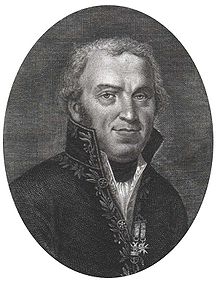Giovanni Battista Venturi
| Giovanni Battista Venturi | |
|---|---|
 |
|
| Born |
15 March 1746 Bibbiano |
| Died | 24 April 1822 (aged 76) Reggio Emilia |
Giovanni Battista Venturi (Bibbiano, 11 September 1746 – Reggio nell'Emilia, 10 September 1822) was an Italian physicist, savant, man of letters, diplomat and historian of science. He was the discoverer of the Venturi effect, which was described in 1797 in his Récherches Experimentales sur le Principe de la Communication Laterale du Mouvement dans les Fluides appliqué a l'Explication de Differens Phenomènes Hydrauliques, translated into English in 1837 by Thomas Tredgold as "Experimental Inquiries Concerning the Principle of the Lateral Communication of a Motion in Fluids," in Tracts on Hyraulics. Because of this discovery, he is the eponym for the Venturi tube, the Venturi flow meter and the Venturi pump.
Born in Bibbiano, Italy, in the Province of Reggio Emilia Giovanni was a contemporary of Lagrange and Laplace, and a pupil of Lazzaro Spallanzani. He was ordained as a priest in 1769, at the age of 23, and in the same year was appointed as teacher of logic at the seminary of Reggio Emilia, where he had earlier received an education. In 1774 he became a professor of geometry and philosophy at the University of Modena. He later held the posts of ducal mathematician, state engineer, and auditor under the Duke of Modena. As state engineer he was responsible for bridge construction, rectification of water courses, draining of marsh land, and the establishment of State regulations for dam construction. In 1786 he was given the post of professor of experimental physics at the University of Modena, where he organized a laboratory, equipping it with state-of-the-art equipment. During this time he was also able to complete the town of Modena's historical memoirs, which had been left incomplete following the death of Girolamo Tiraboschi, the appointed historian.
...
Wikipedia
